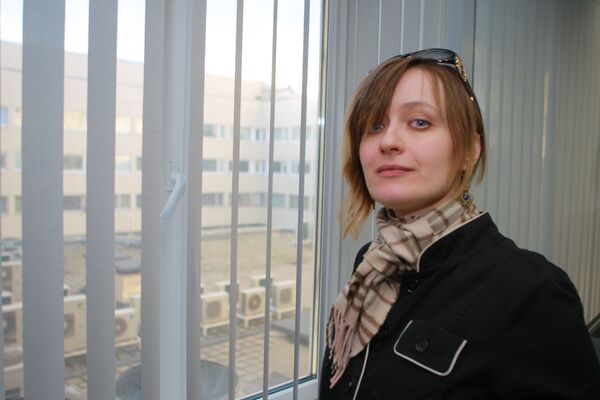In Hollywood movies, marriage counseling is often used as a comic device. You have your neurotic couple, your off-color therapist, a garish setting - all to drive the point home that if you have to work at your marriage, the blessed union wasn’t worth it to begin with. And in real life, marriage counseling doesn’t lend itself easily to film, unless you’ve decided to create a psychological horror-fest a la Roman Polanski: it’s mostly long silences, punctuated by angry outbursts or bitter tears.
Yet after spending some time in Russia, I have gained new respect for the professional marriage counselor - probably because the alternative to him or her is so much worse.
By “alternative” I mean, of course, the dreaded purveyors of all things supernatural: the so-called witches and warlocks, who have “inherited” their “gifts” from “a long line of other witches and warlocks” (I’m quoting real text from a newspaper advertisement here, mind you), the various psychics who prey on the desperate and the gullible, the self-styled gurus reeking of cheap incense, and every other manner of charlatan and crook.
This army of darkness arose in the turbulent 1990s, when many Russian people became particularly vulnerable to manipulators of every stripe. Back then if your marriage was on the rocks, the “fashionable” thing to do was to meet up with some mysterious woman, as recommended by your cousin’s husband’s best friend, who would charge you a lot of money to dramatically announce that your spouse was cheating, and then charge you an extra amount to “cast a spell” in order to bring them back.
Particularly gifted fortune tellers would have their victims coming back for more and more. A relative of mine fell prey to such a scheme when her own marriage started falling apart: in this case, the well-provided-for guru didn’t even ask for money. Instead, my relative became a kind of unpaid personal assistant, catering to the guru’s incessant demands for years. It wasn’t quite indentured servitude, but it was close to it - all for the sake of regularly hearing the earth-shattering revelation that her husband was a jerk.
How could an otherwise intelligent person fall for such a scheme? First of all, she was desperate and lonely. Yet equally important was the fact that in her world regular psychological counseling simply didn’t exist. Therapists were “for crazy people” and she didn’t want to be “tainted” by becoming a patient. Marriage counseling was simply unheard of. What? Have another person talking to you about your family? But that would be an invasion of privacy!
I take it as a sign of progress that several years later, a sympathetic doctor at a regular old clinic noticed that this woman was severely stressed out and recommended a normal therapist.
And while marriage therapy is not some sort of universal panacea, it at least tends to have some professional standards involved.
I don’t have an ingrained distaste for all things supernatural - I am religious, after all, and being religious automatically means believing in stuff that exists far beyond the reaches of our regular day-to-day lives. I’ll even cop to reading tarot cards - which are themselves becoming fashionable in Russia nowadays - though I certainly don’t believe in the notion that they can somehow predict the future (making sense of the present, however, is a another ball of wax).
So when someone like me says that psychics in Russia have gone completely out of control, then yes, there’s most likely a real problem. The way in which they affect marriages is particularly insidious, because a charlatan’s modus operandi usually involves pitting one partner against another - it’s a divide and conquer tactic meant to establish dominance and control. A person in a happy, stable frame of mind is not going to fork over their hard-won rubles for more and more “spells” and “psychic readings,” so an ideal customer is actually a desperately unhappy one.
This is why nowadays it’s not uncommon to hear advertisements for family counseling over a loudspeaker on the Moscow subway system, while news reports on various tragedies often make sure to point out that psychological assistance is being provided for survivors. The government has caught on to the notion that popularizing real psychological services will help neutralize the crooks.
And who knows? Maybe in a few years’ time, actual marriage counseling in Russia will be as commonplace and become another pop culture punchline.
The views expressed in this article are the author's and do not necessarily represent those of RIA Novosti.
Trendswatcher: Fair elections and “fashion?” Not so fast
Trendswatcher: The way of the gun
Trendswatcher: Buying into the car craze - for sanity’s sake
Trendswatcher: A nice day for a ZAGS wedding
Trendwatching in Russia is an extreme sport: if you’re not dodging champagne corks at weddings, you’re busy avoiding getting trampled by spike heels on public transportation. Thankfully, due to an amazing combination of masochism and bravado, I will do it for you while you read all about it from the safety of your living room.
Natalia Antonova is the deputy editor of The Moscow News. She also works as a playwright – her work has been featured at the Lyubimovka Festival in Moscow and Gogolfest in Kiev, Ukraine. She was born in Ukraine, but spent most of her life in the United States. She graduated from Duke University, where she majored in English and Slavic Literature. Before coming to Moscow, she worked in Dubai, UAE and Amman, Jordan. Her writing has been featured in The Guardian, Foreign Policy, Russia Profile, AlterNet, et al.

